Bb6.2
We must pay attention to the names given, as well as to
everything else, because they were like pixels in the global
picture, and only what was relevant would have survived
through the ages:
584 (Venus) = 576 + 8 = 2 * 288 + 8 = 8 * 72 + 8.
... the basis of their reckoning had
been the number eight and this number recurred in what
they called in French la centaine, which for them
meant eighty ...
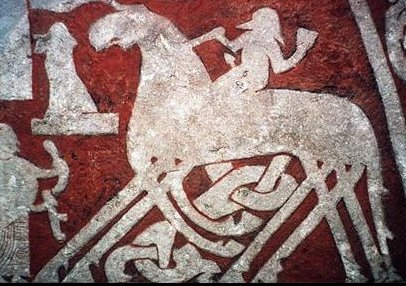
For there was a Wooden (Odin)
Horse with 8 legs,
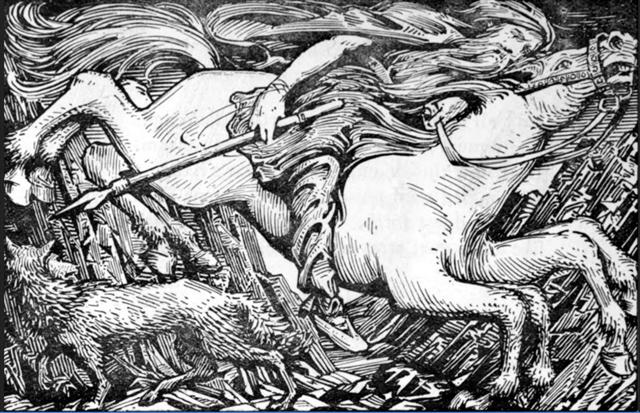
and in order to translate such mythic names into the relevant
details of the grand old picture we have to correlate with
our modern re-membered associated ideas. Only this way can we
reach back in time to integrate.
 |
 |
 |
 |
 |
 |
|
Bb6-1 (25 * 25) |
Bb6-2 |
Bb6-3 (619 + 8) |
Bb6-4 (2 * 314) |
Bb6-5 |
Bb6-6 |
|
Febr 18 (41.4) |
19 |
20 |
21 |
22 (53) |
Terminalia (419) |
|
DEC 16 (350) |
17 |
18 |
19 |
20 |
SOLSTICE |
|
Rooftop-12 (Swallow)
22h (334.8)
KAE UH (Roof) =
ο
Aquarii
(334.0),
AL KURHAH (White Spot) =
ξ
Cephei (334.4),
SADALMELIK (Lucky King)
=
α
Aquarii,
AL DHANAB (The Tail) =
λ
Gruis
(334.6),
ι
Aquarii,
ν
Pegasi (334.7)
*293.0 = *334.4 - *41.4 |
ι
Pegasi (335.0),
ALNAIR (The Bright One)
=
α
Gruis
(335.1),
μ
Piscis Austrini,
υ
Piscis Austrini (335.3),
WOO (Pestle) =
π
Pegasi
(335.7),
BAHAM =
θ
Pegasi (Good Luck of the
Two Beasts),
τ
Piscis Austrini (335.8) |
ζ
Cephei (336.2),
λ
Cephei (336.3), -/270
Lac.
(336.7), λ Piscis
Austrini (336.8) |
μ
Gruis (337.0),
ε
Cephei (337.2), 1/325
Lac. (337.3),
ANCHA (Hip) =
θ
Aquarii
(337.4),
ψ
Oct.
(337.5), α Tucanae
(337.9)
*296.0 = *337.4 - *41.4 |
Al Sa'ad al Ahbiyah-23
(Lucky Star of Hidden
Things) /
Shatabisha-25
(Comprising a Hundred
Physicians)
ε
Oct. (338.1),
ρ
Aquarii
(338.2), 2/365
Lac.
(338.5),
SADACHBIA =
γ
Aquarii
(338.6),
π
Gruis (338.9) |
β/172
Lac. (339.2),
4/1100 Lac. (339.4),
π
Aquarii
(339.5)
*298.0 = *339.4 - *41.4
CASTOR (α Gemini) |
 |
|
υ² Hydrae (151.8) |
Al Jabhah-8 (Forehead) /
Maghā-10 (Bountiful) /
Sharru-14 (King)
10h (152.2)
AL JABHAH =
η
Leonis (152.4),
REGULUS (Little KIng) =
α
Leonis
(152.7)
*111.0 = *152.4 - *41.4 |
λ Hydrae (153.2) |
ADHAFERA = ζ Leonis,
TANIA BOREALIS (Northern
Gazelle) = λ Ursae
Majoris, SIMIRAM = ω
Carinae
(154.7) |
ALGIEBA (The Mane) =
γ
Leonis,
q Carinae (155.5) |
TANIA AUSTRALIS
(Southern Gazelle) =
μ
Ursae Majoris
(156.0),
GHOST OF JUPITER =
NGC3242 Hydrae
(156.8) |
.jpg) |
|
Aug 19 (231) |
20 |
21 |
22 |
23 |
24 (8 * 29½) |
|
"July 9 (190) |
10 |
11 |
12 |
13 |
14 (195) |
Next step is to explain
why these ideas have
been
re-membered. Mostly I
will not try do so explicitly
because it would drown
my presentations.
Instead I have inserted
a hyperlink to at least
some parts (mudbricks) of what
could be
helpful. By doing so it
should become evident that a
relevant detail is
always embedded in a
group of more such re-levant
details. This we ought
to see
when following a
hyperlink to another
place in the B text.
For instance can my
link above from the Hip
(Ancha) of Aquarius to
the beginning of my
presentation of line Bb2
reveal several further
associations, e.g.:
...
However, the dislocation
[of the hip of Tantalus
- like that of other
sacred kings] may have
been produced - and it
is likely that still
another method [than
'... produced by wide
abduction of the thighs
... when a person
embarking in a boat
remains undecided
whether to get in or
remain on land.'] was
practised on a hill-top,
not beside a river -
there was a taboo in
Canaan on eating the
flesh around the
thigh-bone, as is
expressely stated in
Genesis in the story
of Jacob's wrestling at
Peniel ...
This undecided
(hazardous) outcome
at the top of the
Hill will then
make us remember the
letter of
Pythagoras, and so
on without limit.
Every little gem of
insight (creative
splash) will make
further ripples
surrounding its center.
|
Egyptian
sky pillar |
 |
Phoenician
waw |
 |
Greek
upsilon |
Υ(υ) |
|
... Upsilon
(uppercase
Υ, lowercase
υ; Greek:
ύψιλον,
ıpsilon ...
is the 20th
letter of
the Greek
alphabet. In
the system
of Greek
numerals, Υ
has a value
of 400. It
is derived
from the
Phoenician
waw ... Waw
(wāw
'hook') is
the sixth
letter of
the Semitic
abjads ...
...
Upsilon
is known as
Pythagoras'
letter, or
the Samian
letter,
because Pythagoras
used it as
an emblem of
the path of
virtue or
vice. As the
Roman writer
Persius
wrote in
Satire III:
and the
letter which
spreads out
into
Pythagorean
branches has
pointed out
to you the
steep path
which rises
on the
right.
Lactantius,
an early
Christian
author (ca.
240 - ca.
320), refers
to this:
For they say
that the
course of
human life
resembles
the letter
Y, because
every one of
men, when he
has reached
the
threshold of
early youth,
and has
arrived at
the place
'where the
way divides
itself into
two parts',
is in doubt,
and
hesitates,
and does not
know to
which side
he should
rather turn
himself´...
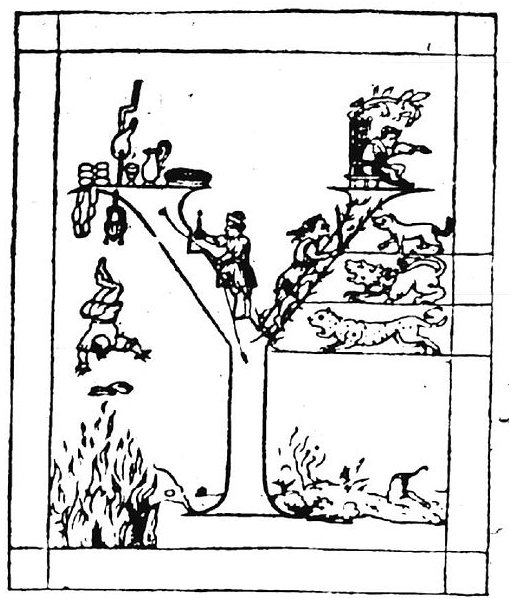 |
And then this
form of Y will
bring us back
again to the
Breast
of Cassiopeia.
From the Sun at
the Breast (hipu)
in
November 18
- when
the cycle
of Lono
was beginning on
Hawaii - at the
time
when the Full
Moon was in the
day after the
Boat (Zaurak)
 |
 |
|
Bb3-33
(111 = 2
* 266 -
421) |
Bb3-34
(13 * 41
= 542 -
9 = 168
+ 365) |
|
mai tae
tu |
ki te
hipu |
|
Hipu.
Calabash,
shell,
cup,
jug,
goblet,
pot,
plate,
vase,
bowl,
any such
receptacle;
hipu
hiva,
melon,
bottle;
hipu
takatore,
vessel;
hipu
unuvai,
drinking
glass. P
Mgv.: ipu,
calabash,
gourd
for
carrying
liquids.
Mq.: ipu,
all
sorts of
small
vases,
shell,
bowl,
receptacle,
coconut
shell.
Ta.: ipu,
calabash,
cup,
receptacle.
Churchill.
 |
|
Nov 17 |
18 (322) |
|
Iklīl al
Jabhah-15
(Crown
of the
Forehead)
/
Anuradha-17
(Following
Rādhā)
/
Room-4
(Hare)
ξ
Lupi,
λ
Cor.
Bor.(241.1),
ZHENG =
γ
Serpentis,
θ
Librae
(241.2),
VRISCHIKA
=
π
Scorpii
(241.3),
ε
Cor.
Borealis
(241.5),
DSCHUBBA
(Front
of
Forehead)
= δ
Scorpii
(241.7),
η Lupi
(241.9) |
υ
Herculis
(242.3),
ρ
Cor.
Borealis
(242.4),
ι
Cor.
Borealis
(242.5),
θ
Draconis
(242.6),
ξ
Scorpii
(242.7)
SCHEDIR
(Breast)
α
Cassiopeiae
*201.0 =
*242.4 -
*41.4 |
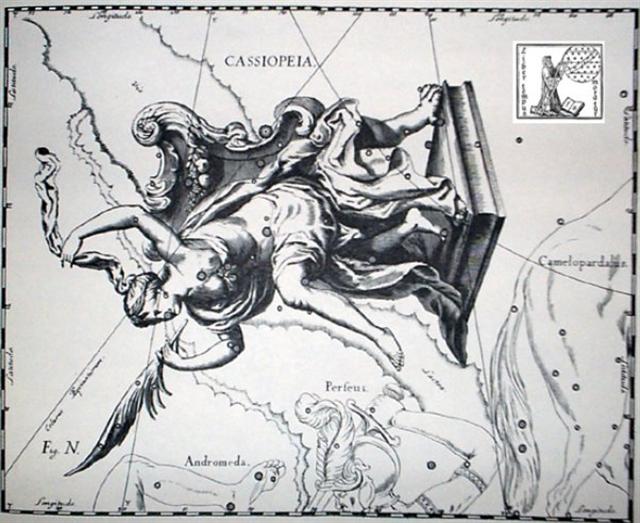 |
|
RIGHT
ASCENSION
DAYS AT
THE FULL
MOON: |
|
ZAURAK
(Boat) =
γ
Eridani
(58.9) |
λ Tauri
(59.3),
ν Tauri
(59.9) |
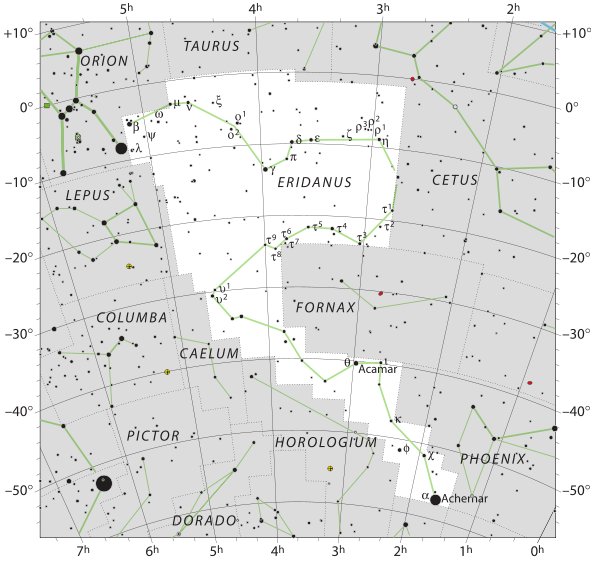 |
to the
point when the
Sun reached the
completely
clean (and exhausted)
figure in the
day before the
Navel of the
Horse there were
85 (= 365 - 280)
days. i.e. a
year minus 40
weeks:
|
 |
84 |
 |
 |
 |
|
Nov
18
(322) |
Febr 11 |
12
(408) |
Aa1-72
→
408
-
236 |
|
SCHEDIR |
SIRIUS |
SIRRAH |
ki
tona
pure |
The
maro
hanging down
in front was
attatched to
the lower
rim in
November 18,
but at
February 11
(→
2 11 → 210 +
1) it
was a
prolongation
of the upper
rim of the
vessel.
... At the
beginning of
44 B.C. -
when Ceasar
was still
alive - the
Senate
decided to
raise
statues of
him in all
the temples
and to
sacrifice to
him on his
birthday in
the month
Quintilis,
which in
honour of
him was
renamed
July. He was
raised to
the status
of a god
(among the
other gods
of the
state) under
the name
Jupiter
Julius.
Marcus
Antonius,
who this
year was
consul
together
with Caesar,
became high
priest and
responsible
for the
ceremonies.
In the
middle of
February, at
the time of
the old
feast of
Lupercalia
[Lupus
= Wolf], he
ran around
naked and
whipped the
Roman ladies
with thongs
made from
goat-skin [februa],
in order to
promote
their
fertility
...
A leg (and a
loincloth) is
locted below
the midline
whereas an
arm is
above. An
arm is
beginning at
an armpit (Ascella,
ζ)
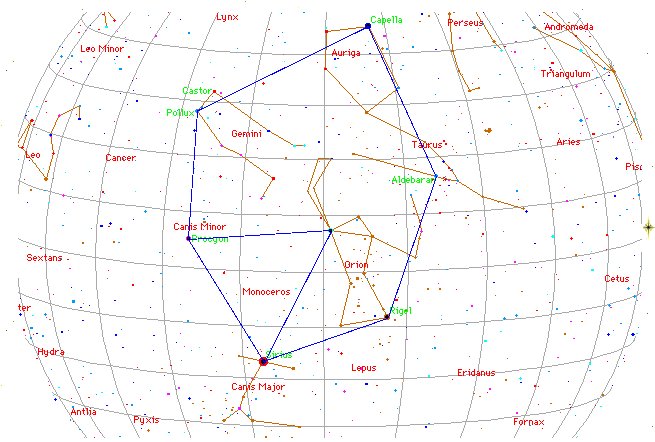
and a leg at
the hip
(Ancha,
Θ) -
or possibly,
as Hevelius
has hinted,
at the place
for the
lowest ribs
(Al
Sharas).
We can
surely be
drowned by
all these
associative
ripples
causing a
deluge.
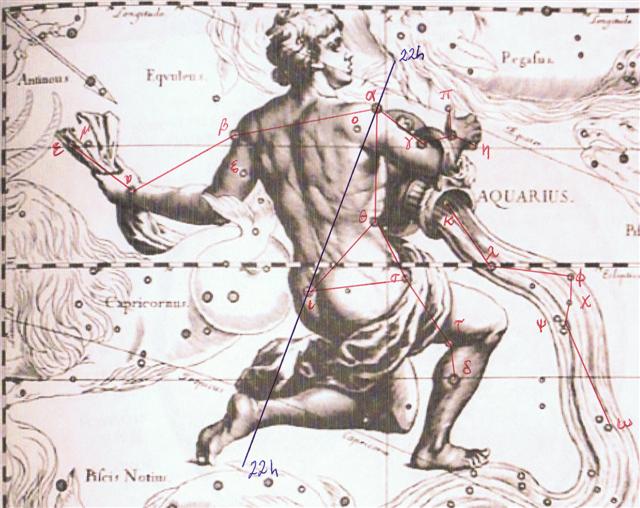
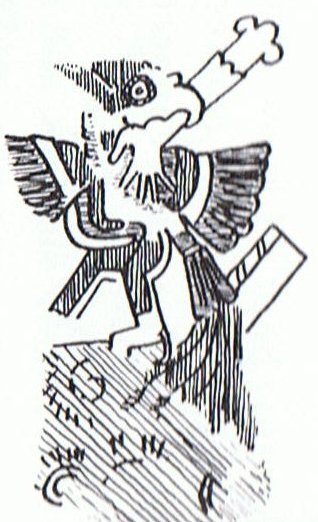
|





.jpg)









